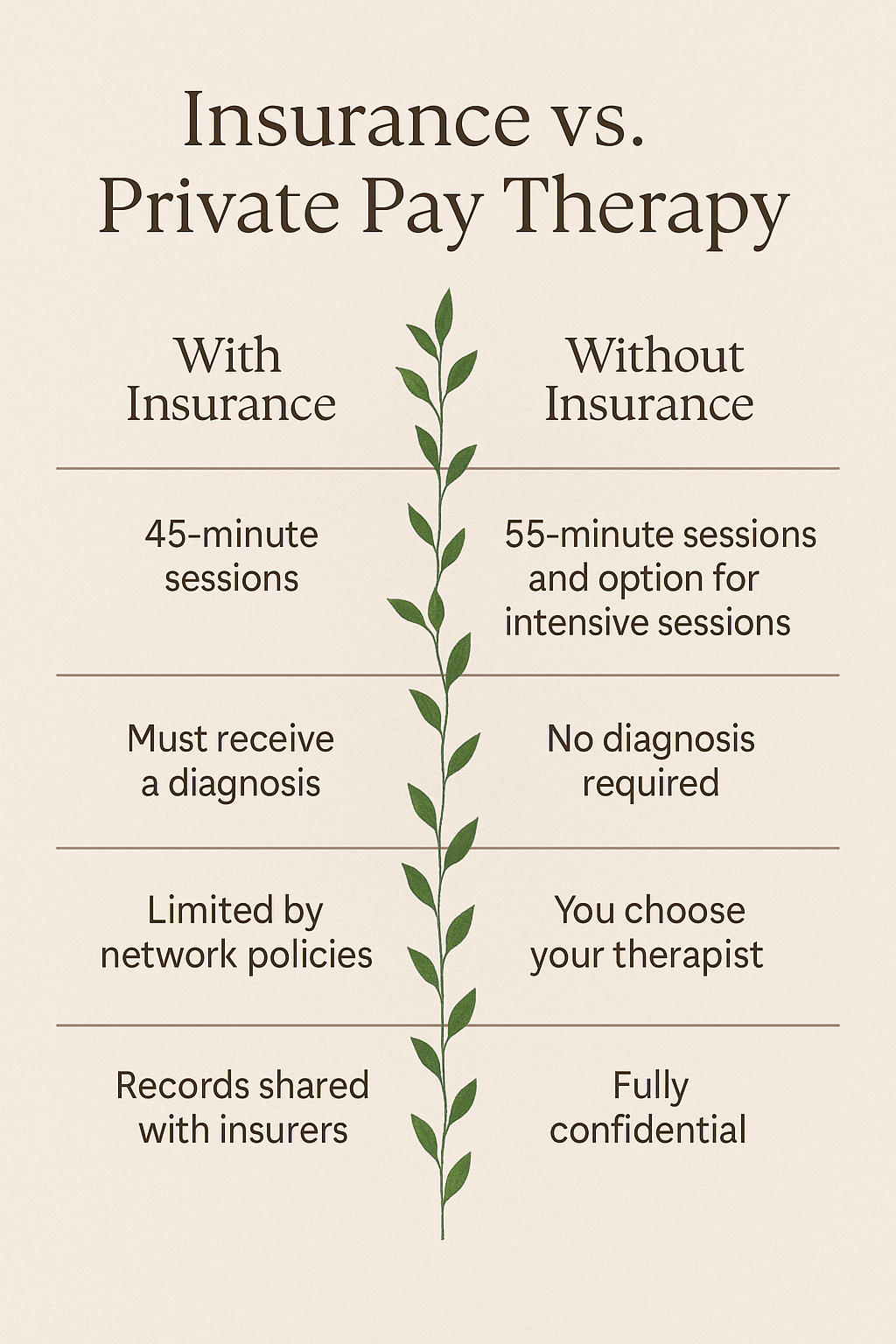Why I Don't Accept Insurance (And Why That's Actually Good for YOU)
⚠️ Need a heads-up? This post takes about 2.5 minutes to read silently (or 5 aloud).
Let’s talk about the elephant in the therapy room: I don’t accept insurance. And I get it, at first glance, that might feel like a hassle. But hang with me, because there are actually some really solid reasons why this can be a good thing, not just for me, but for you too.
Here’s why I’ve chosen to keep insurance out of the therapy room and how it might benefit you more than you think:
1. Your Privacy Stays… Private
When insurance is involved, they want a lot of information. Diagnoses, treatment plans, sometimes even notes. That means your personal story, your pain, your growth, it all gets filtered through a system that doesn’t know you.
By not using insurance, we get to keep what happens in session between us. No outside approvals, no hoops to jump through. Just real, honest therapy.
2. Therapy That’s Tailored to You, Not a Policy
Insurance companies often have a say in how many sessions you can have, what kind of therapy you get, and how quickly you should “feel better.” But healing doesn’t run on a clock or follow a script. Healing is an individual process, it’s different for everyone.
Working outside of insurance means we can take our time. You’re not a checklist—we’ll go at a pace that actually works for your life. I find that it takes the “feeling like just a number” out of the process.
3. No Forced Diagnoses Just to Get Started
Most insurance companies require a mental health diagnosis before they’ll cover your sessions. And while sometimes a diagnosis is appropriate or obvious, other times it just... isn’t.
Not everyone who comes to therapy is mentally ill; some are overwhelmed, grieving, stuck, or trying to grow. When we’re not working under insurance, we don’t have to force labels that don’t fit just to get permission to help you. You’re an adult, why should you have to ask “Daddy Insurance” if you’re allowed to start feeling better?
4. You’re Hiring Me, Not Your Insurance Company
This one’s big. When you pay out-of-pocket, I work directly for you, not for a corporation. That means the decisions we make in therapy are based on what you need, not what an insurance rep thinks you should get, or the manner in which you should get it.
5. It’s Simpler. Really.
No surprise bills. No rejected claims. No hours spent on hold trying to figure out what “out-of-network deductible” even means. You know the cost upfront, and that’s it.
It’s cleaner. Easier. More human.
6. You Get to Pick the Right Therapist, Not Just the Closest One In-Network
Let’s be honest, finding someone in-network who also happens to be the right fit is like trying to find a needle in a haystack. But when you step outside of insurance, you get to choose someone based on how they connect with you, not just who your plan allows.
Therapy is too important to settle.
7. For Some, Privacy Is About Safety, Not Just Comfort
This one hits especially close to home for me. I work with a lot of first responders and military veterans, people who’ve been trained to be tough, to push through, to handle things on their own. And while that grit is admirable, it can also become a barrier to getting help when they need it most.
Many folks in these roles are hesitant to seek counseling through their insurance or workplaces because they worry (often with good reason) about how it could affect their careers. A formal diagnosis in their record might raise red flags when it comes to security clearance, job retention, or future promotions. So instead of getting support, they stay silent. And the cost of that silence? It’s burnout, strained relationships, substance use, anxiety, depression, and worse.
By offering therapy outside of insurance, I can provide a space where they don’t have to worry about what’s going on paper. No labels. No reports. Just support. Just healing. Just a human being helping another human being carry something heavy.
If you’re in one of those roles and you’ve hesitated to reach out because you were afraid of what it might cost you professionally, I see you. And I created this practice with you in mind.
8. More Time, More Depth
Most insurance plans only cover 45-minute sessions, sometimes even less, and if you’ve ever tried to unpack a lifetime of stress, trauma, or relationship patterns in under an hour, you know how rushed that can feel.
Because I don’t work with insurance, I’m not boxed into that time limit. My standard sessions are 55 minutes, and when needed, we can go even longer. For some clients, especially those working through trauma or big transitions, I also offer extended or intensive sessions that allow us to dive deep without watching the clock.
Therapy shouldn’t feel like a race, it should feel like room to breathe.
Bottom Line?
Choosing not to use insurance helps me protect your privacy, tailor therapy to you, and offer support that’s actually helpful, not filtered through red tape.
It’s not the “traditional” route, but I’ve found it’s the one that leads to the most authentic, effective work. If you’re curious, or if any of this resonates, reach out. I’d love to talk more.

